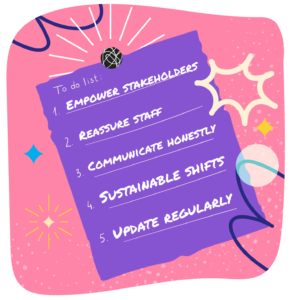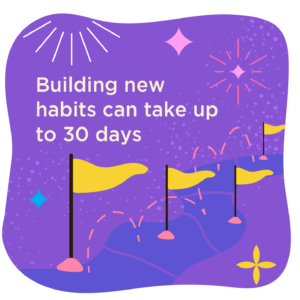If you’ve not already been inundated with Instagram stories, TikTok posts and messages from friends about what they’re changing or giving up for their New Year’s Resolutions, you’d better get ready…
The gym selfies and Dry January updates are all over social media, but what about people who don’t feel like they want to change anything right now? This time of year can feel like a whirlwind, and it could leave them feeling like they should be changing.
Whether or not you’re making a change, the New Year offers an opportunity for reflection. But there’s no shame in starting the New Year as the same old (lovely) you.

Change, change, change
We’re told to start the New Year with a change. It’s everywhere. Stop drinking, start prioritising yourself, and finally delete your X account. (Sorry, not sorry, Elon)
Not everyone should feel like this time of year has to bring change. Let us explain.
Change can be overwhelming. That doesn’t make it bad, of course. But the constant barrage of other people changing something and succeeding or struggling, can itself be a source of negativity at a time of year when the sun is hiding and it already feels a bit pants out there.
Resolutions can often stifle positive change, or have people making changes that they feel obligated to make.
The alternative? De-competivise change. Make it optional, more achievable and more likely to be sustainable.
Achieving more reliable change (…should you want it)
More often than not, it’s human nature to try and make a big change to get quick results.
But equally as often, we’re unable to maintain that big change and when the results don’t come when we expect, we get a bit annoyed with ourselves.

For example, you’ll probably find that stopping caffeine after 4pm is more achievable than stopping caffeine for ALL of January. Or, you’ll find that giving yourself 15 minutes of reading time 5 days a week will reap longer-term benefits than trying to read a book every 2 weeks for a whole year.
The secret here is building new habits, without feeling like you’re going cold turkey, or throwing yourself in at the deep end. According to Phillippa Lally, a researcher at UCL, it takes anywhere from 18 to 254 days to form a new habit, so slow and steady wins the race!
The small things we do add up to make a big difference over time. Think of the 1% changes that, together, create a lasting impact – without feeling like you’re trudging through mud or walking on hot coals to get there.
Importantly, this means you’re not setting out to change who you are, but rather to improve who you are. We don’t like the narrative of “not being good enough” and “needing change.” Small changes mean you keep the best parts of you and make them even better through being kind to yourself.
Communicating change
For organisations that want to communicate change, internally or externally, they may also struggle to avoid the pitfalls we mentioned above. Simply put, we believe change is more possible to implement when it’s communicated effectively.

Whether you’re welcoming a new CEO or making structural changes to your team, communicating change is no easy task. That’s where we can help. We support organisations like yours to communicate change in a way that empowers stakeholders, reassures their people and makes long-term, sustainable shifts a more plausible reality.
Talk to us
It’s the new year, but we’re proud to be the same old us. If you’d like a chat about upcoming comms campaigns, a challenging change that’s on the horizon, your brand or anything in-between, please give us a shout. We’ll stick the kettle on.
















